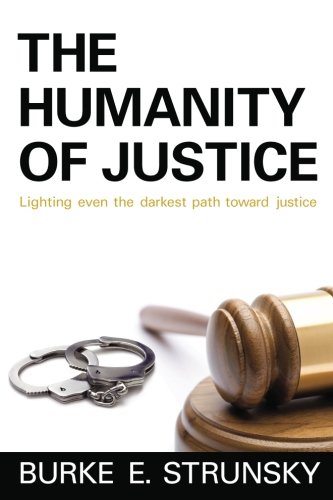Against the backdrop of his most haunting, high-profile murder and child abuse cases, a veteran prosecutor goes beyond an insider’s reflection to shine a light on the humanlike qualities personified in the U.S. criminal justice system and what this means for our future. The Humanity of Justice is a procedural true-crime book told through the eyes and heart of a veteran criminal prosecutor who cares about the people he meets and their life-altering circumstances. Burke E. Strunsky, a senior deputy district attorney in southern California, takes the reader inside the courtroom for some of the most haunting criminal cases in the state as well as the nation, including: a highly respected church leader who brutally murders his wife for the insurance money while their baby sleeps peacefully in another room; a twisted father who sexually molests his daughter’s own friends at her slumber parties; a former police chief who drowns his wife of thirty years in their backyard spa; and a young man who sadistically tortures and kills a helpless three-year-old boy, yet manages to dodge the death penalty. Strunsky’s own impassioned social and moral commentary is woven throughout this thought-provoking book on issues significant to the world of criminal justice. Even in the midst of the darkest stories, the voices and courage of the victims and those who love them will leave the reader touched and inspired. 100% of the proceeds from this book will be donated to The Humanity of Justice Foundation, a non-profit organization, to help prevent child abuse and neglect.
Product Features
- Finally a True Crime Book for the Thinking Person






Restoration Read the newspapers, listen to the `instant overage’ reports on the radio news, watch the daily rundown on the 11 o’clock television broadcasts, or observe the stories on the innumerable crime series shows throughout the television networks – we are daily saturated with crime and incredible acts of violence, and often times are left to wonder why our judicial system is so inept at deciding who is convicted and who goes free and the crowding of the jails so that hardened criminals are set free due to lack of space in the prisons. So often the news is about lawsuits brought after the fact and the way that lawyers get around the conviction of fairly obviously guilty criminals. It is disillusioning – until now.For everyone who has lost faith in the government and that branch of the government called the judicial system Burke E Strunsky’s book THE HUMANITY OF JUSTICE will serve as a buoy, a life raft, a Gilead for those who think that our systems consistently fail us. Strunsky is a prosecuting attorney who redefines the roll of the courts through the eyes of a compassionate lawyer who returns the nidus of our legal system to the most important body – the jury of citizens who decide the fate of the accused. He shares a book full of cases (not invented, but reported0 that demonstrate his passion for justice and his belief in the humanity of the American legal system. Yes, they are impressive enough as `short stories’ to be a crime novel, but since these are experiences Strunsky has shared that gain poignancy that will alter the negative opinions of many who read it.Strunsky states, `The portrayal of violence on TV and the glorified killings so graphically animated in videogames and movies have desensitized us, especially the young, to the realities of violence. While I sometimes fear greatly for the future, I’m also pragmatically optimistic that an examination of the criminal justice system and its human qualities can provide us with a wellspring of hope…a hope that serves as a counterweight to even the most horrific of crimes.’ And later on he clarifies this by saying, `Because when if comes to winning trials, it rarely domes down to the legal and intellectual issues. It has more to do with something humans instinctively express and respond to – it’s called EMOTION. At the end of the day, emotion and impassioned pleas are what wins the hearts and minds of juries, not dense, pragmatic, fact-laden arguments.’From this introductory platform the author takes us through nine chapters, each dealing with a particular kind of crime and each demonstrating to the reader the true meaning of legalese and its outcome: circumstantial evidence, how the seeds of corruption can poison our courtrooms, emotion form the jury and how justice comes form the heart, the importance of acknowledging the fact that the jury is composed of `We the people’, the uses and abuse of language, the conundrum of capital punishment and how it is decided and carried out, the negative role that on the edge religious beliefs can influence the outcome of a case, violence and children and the desperate need for protecting them, and the madness of the massive distribution of handguns and how that affects our crime rate.Strunsky relates these various categories with real cases and writes about them with such polished prose that each case becomes tattooed on our minds. He is a compassionate human being who has done a great service in sharing his thoughts on the humanity of justice. `The pain felt by the victims and those who love them is immense. But so is their strength and hope. While people may be vastly different in terms of personality and outlook, social and economic status, political and religious leanings – we all seem to share something stronger that universally bonds us. I can only describe it as something that, when called forth, is able to shine light on the most brutal darkness.’ This book should be required reading for all of us who have felt the universal angst of how our globe is crumbling with crime that seems out of control. It is IN our control. Grady Harp, September 12
A powerful narrative that also seeks to educate I’ve served on five juries (two armed robberies, one murder, and two civil cases) and I wish I had had the opportunity to read “The Humanity of Justice” before I was called upon to sit in judgment on my fellow citizens. The author, a senior deputy district attorney in California, explains many legal concepts such as ‘beyond reasonable doubt’ and ‘circumstantial evidence’ that I thought I understood, but didn’t.Mr. Strunsky humanizes the law with a series of trials that he was involved in, including many where children were the victims of murder, torture, or molestation. This makes “The Humanity of Justice” hard to read, but also hard to put down as the reader wants to find out whether the perpetrators of such evil acts were punished to the full extent of the law.Incidentally, “100% of the proceeds from this book will be donated to the Humanity of Justice Foundation, a non-profit organization, to help prevent child abuse and neglect.”The author’s passion for his work and for the victims he sees on a daily basis shine through his narrative. I found myself reading far into the night and rooting for Mr. Strunsky and his team to bring both criminals and those who seek to shelter them to justice. His chapter, “Protecting the Guilty in the Name of God” is particularly searing. He indicts churches, including the Roman Catholic, the Mormons, and the Jehovah’s Witnesses for protecting child molesters and ignoring their young victims. The case that he was involved in against the Jehovah’s Witnesses broke new legal ground, and set a precedent that other jurisdictions are now using to prosecute pedophiles who try to hide their crimes behind the trappings of a religion.Although this book is both a good read and has important information to impart, it could have been improved if the author had given it a bit more shape. Instead of sticking to a particular theme such as crimes against children, Mr. Strunsky editorializes on topics such as the death penalty and gun control, and also attempts to educate his readers on important legal concepts such as jury nullification. “The Humanity of Justice” is a good book, but I think it could have been a great book (or maybe three great books) if it had been structured around a single topic.***review copy supplied by publisher
Comments are disabled for this post.